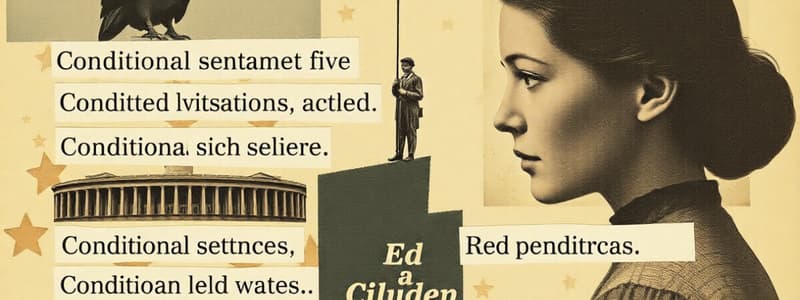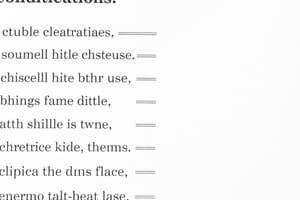Podcast
Questions and Answers
What is the difference between the use of if and when in conditional sentences?
What is the difference between the use of if and when in conditional sentences?
- *if* comes *before* the result, while *when* can come *after* the result. (correct)
- *if* is usually used in conditions with a negative result, while *when* is used in positive results.
- *if* is used for future events, while *when* is used for present events.
- *if* can be used to express the result while *when* is used to express the condition.
Which of the following sentences is NOT a correct example of a conditional sentence?
Which of the following sentences is NOT a correct example of a conditional sentence?
- When you sit in class.
- If I don't study, I will go to the park.
- If I study, I will go to the park. (correct)
- If you listen, I will listen.
- I will study, when I finish my work.
When translating a conditional sentence, how is the meaning of al reflected in the translation?
When translating a conditional sentence, how is the meaning of al reflected in the translation?
- *al* only changes when the result is negative.
- *al* changes its meaning based on the form of the *فعل* involved.
- *al* can have three different translations based on the context. (correct)
- *al* always leads to a direct translation, indicating a condition.
What is the purpose of using the مضارع 3 ما فی form in conditional sentences?
What is the purpose of using the مضارع 3 ما فی form in conditional sentences?
If a conditional sentence starts with when, what can be inferred about the فعل in the result clause?
If a conditional sentence starts with when, what can be inferred about the فعل in the result clause?
Flashcards
Conditional Sentences
Conditional Sentences
Sentences that express a condition and its result.
شرط (Condition)
شرط (Condition)
The 'if' part of a conditional sentence.
جزاء (Result)
جزاء (Result)
The outcome or consequence in a conditional sentence.
Use of 'if'
Use of 'if'
Signup and view all the flashcards
Use of 'when'
Use of 'when'
Signup and view all the flashcards
Study Notes
Conditional Sentences
- Conditional sentences can be translated in three ways, although the meaning doesn't change significantly.
- The condition is the "if" part, and the result is the "then" part.
- You use "if" or "when" for these sentences.
- "If," "when" is used for these sentences.
Rules for "if"
- "If" is usually placed before the result clause.
- Both the condition and result are on the same line (in the same clause).
Rules for "when"
- "when" can be used instead of "if"
- The "when" clause doesn't include the verb in the "result" part.
- It will be translated as the present tense.
Studying That Suits You
Use AI to generate personalized quizzes and flashcards to suit your learning preferences.





